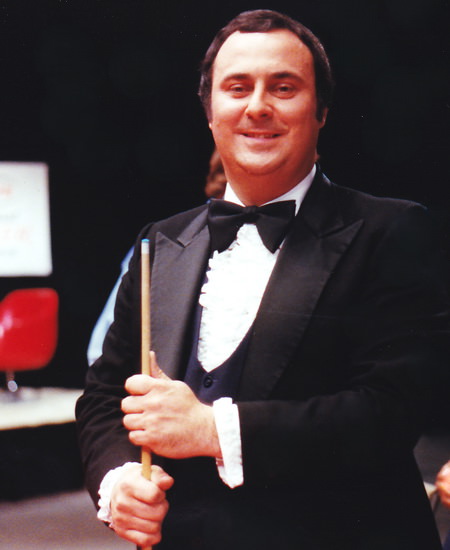ROBERT PAQUETTE

Photo: Phil Cunningham Personal Collection
ROBERT PAQUETTE
Montreal, Quebec
“Bob was the best amateur player that ever came out of Canada. Before I went to play in the World Championship in 1980, I went to Quebec to practice with him because his calibre of play was closest to that of the greatest players in the world. He was the best player to split the pack and break build. He had incredible control over the cue ball.”
- Cliff Thorburn
“His snooker playing talent of course cannot be denied – and impress me as he did on the table, what stands out most for me when I look back fondly on my times with him, is what he stood for. He represented the game with class and integrity. He recognized and appreciated excellence in others. He was generous with his praise, and he was a true gentleman who – for me – was the embodiment of sportsmanship.”
-Bob Hargrove
Robert Paquette was a prominent player in Quebec for the better part of five decades. He was a multi-time Montreal City Champion, Quebec Amateur Champion and six-time runner up in the Canadian Amateur Snooker Championships. He also represented Canada playing snooker internationally and it is generally accepted among the Canadian snooker cognoscenti that Paquette was the best Canadian amateur snooker player to never play professionally. He was also a skilled billiards player and television analyst.
Paquette was introduced to the game by his older brother Jacques, himself an excellent player who became his first coach. He had a remarkable natural long stroke and his masterful control of the cue ball in combination with his tactical intelligence on the table made him a formable opponent.
Robert Paquette began his career in the mid-1960s. In 1971, the year following the passing of legend George Chenier, Paquette organized a Montreal contingent to challenge for the North American Championship vacated by Chenier’s death although the efforts did not result in a win.
Paquette reached the final of the Canadian Amateur Snooker Championship for the first time in 1973, losing a tight match 16-15 to Bill Werbeniuk. Although he would never win his national championship, he had a great deal of success, reaching the final of the Canadian Amateur Snooker Championship five times from 1977 to 1982: he lost 10-6 to Cliff Thorburn in 1977; 10-6 to Kirk Stevens in 1978; 10-7 to Jim Wych in 1979; 9-3 to Jim Bear in 1980 and 9-7 to Robert McConnell in 1982.
He represented Canada three times at the World Amateur Championships. In 1976 in Johannesburg, South Africa, in 1978 in Rabat, Malta and in 1990 in Launceston, Australia. His best performance came in 1978 when he reached the quarter-finals losing narrowly 5-4 to Kevin Burles of Australia after finishing second in his group with 5 wins and 3 losses overall.
In 1978, he was one of four Canadian players, along with Cliff Thorburn, Kirk Stevens and Ken Shea, chosen to represent Canada competing in a televised challenge tournament featuring 1972 World Champion Alex Higgins of Northern Ireland and the reigning World Champion John Spencer of England at CFTO television in Toronto.
Cliff Thorburn credited Paquette with helping him get into form before his World Championship win in 1980. Thorburn chose to go to Quebec to practice with Paquette because his calibre of play was closest to that of the greatest players in the world. Thorburn stated that Paquette was the best player to split the pack and break build citing his incredible control over the cue ball.
At the end of his playing career Robert Paquette became active in establishing tournaments to promote snooker. He was generous with his time and knowledge and was a coach and mentor to junior players, including Alain Robidoux. He also contributed his time to the organization of the sport on a national level serving as the president of the Canadian Amateur Snooker Association in the 1970s.
Robert Paquette died in 2016. In recognition of his longstanding contribution to the advancement and reputation of Canadian snooker he was posthumously inducted into Canadian Snooker Hall of Fame in 2024.
